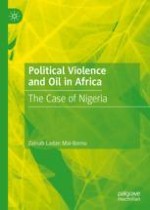2020 | OriginalPaper | Chapter
6. Organising Nonviolent and Violent Struggles—the Ogoni and Ijaw
Author : Zainab Ladan Mai-Bornu
Published in: Political Violence and Oil in Africa
Publisher: Springer International Publishing
Activate our intelligent search to find suitable subject content or patents.
Select sections of text to find matching patents with Artificial Intelligence. powered by
Select sections of text to find additional relevant content using AI-assisted search. powered by
